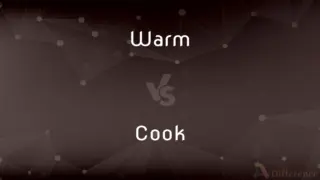Ketone vs. Acetone — What's the Difference?
By Urooj Arif & Maham Liaqat — Updated on April 29, 2024
Ketone is a class of organic compounds characterized by a carbonyl group bonded to two alkyl or aryl groups, while acetone is the simplest and most well-known ketone, used widely as a solvent.

Difference Between Ketone and Acetone
Table of Contents
ADVERTISEMENT
Key Differences
Ketone represents a broader category of organic compounds, each containing a carbonyl group (C=O) linked to two carbon atoms. Whereas acetone is a specific type of ketone, known chemically as propanone, with the formula CH₃(CO)CH₃.
Ketones can vary widely in their molecular structure and thus in their chemical and physical properties, including their boiling points, solubility, and reactivity. On the other hand, acetone is known for its low boiling point, high volatility, and excellent solvent properties.
Ketones are important in various biological processes and are used in the synthesis of other chemicals. While acetone is particularly significant in industrial applications, including as a solvent for paints, plastics, and synthetic fibers.
Ketones often occur naturally in many foods, plants, and as a by-product of fat metabolism in animals. In contrast, acetone is also produced in the human body during ketosis but is manufactured on a large scale industrially.
Ketones serve as useful intermediates in organic synthesis, playing a crucial role in the production of pharmaceuticals and dyes. Distinctiveness, however, positions acetone as an essential laboratory chemical, also used for cleaning and degreasing.
ADVERTISEMENT
Comparison Chart
Definition
Class of organic compounds with a C=O group.
Simplest ketone with a CH₃(CO)CH₃ structure.
Variability
Diverse structures and properties.
Specific chemical properties and uses.
Uses
In food, industry, and biology.
Solvent in industry, lab chemical, in nail polish remover.
Production
Naturally occurring and synthetic.
Naturally in body and synthetic on a large scale.
Importance in Synthesis
Intermediate in complex chemical syntheses.
Widely used, versatile solvent.
Compare with Definitions
Ketone
A compound with a carbonyl group bonded to two alkyl or aryl groups.
Acetophenone, a ketone, is used in perfumery.
Acetone
Simplest and most well-known ketone.
Acetone is commonly used as a solvent for paints.
Ketone
Characterized by its functional group (C=O).
Many ketones are important in organic chemistry.
Acetone
Excellent solvent properties.
Acetone dissolves many plastics and synthetic fibers.
Ketone
Diverse in structure and properties.
The boiling points of ketones vary significantly.
Acetone
Essential in laboratories and industries.
Acetone is used for cleaning lab equipment due to its degreasing properties.
Ketone
Found in many biological and synthetic materials.
Ketones appear as metabolic products in certain diets.
Acetone
Produced both biologically and industrially.
Acetone is produced in the body during ketosis.
Ketone
Used as intermediates in organic synthesis.
Some complex ketones are synthesized for pharmaceutical use.
Acetone
Low boiling point and high volatility.
Acetone evaporates quickly at room temperature.
Ketone
In chemistry, a ketone is a functional group with the structure R2C=O, where R can be a variety of carbon-containing substituents. Ketones contain a carbonyl group (a carbon-oxygen double bond).
Acetone
Acetone, or propanone, is an organic compound with the formula (CH3)2CO. It is the simplest and smallest ketone. It is a colourless, highly volatile and flammable liquid with a characteristic pungent odour.
Ketone
Any of a class of organic compounds, such as acetone, characterized by having a carbonyl group in which the carbon atom is bonded to two other hydrocarbon groups and having the general formula R(CO)R′, where R may be the same as R′.
Acetone
A colorless, volatile, extremely flammable liquid ketone, C3H6O, widely used as an organic solvent. It is one of the ketone bodies that accumulate in the blood and urine when fat is being metabolized.
Ketone
See ketone body.
Acetone
(organic compound) A colourless, volatile, flammable liquid ketone, (CH3)2CO, used as a solvent.
Ketone
(organic compound) A homologous series of organic molecules whose functional group is an oxygen atom joined to a carbon atom—by a double bond—in a carbon-hydrogen based molecule.
Acetone
A volatile liquid consisting of three parts of carbon, six of hydrogen, and one of oxygen; pyroacetic spirit, - obtained by the distillation of certain acetates, or by the destructive distillation of citric acid, starch, sugar, or gum, with quicklime.
Ketone
One of a large class of organic substances resembling the aldehydes, obtained by the distillation of certain salts of organic acids and consisting of carbonyl (CO) united with two hydrocarbon radicals. In general the ketones are colorless volatile liquids having a pungent ethereal odor.
Acetone
The simplest ketone; a highly inflammable liquid widely used as an organic solvent and as material for making plastics
Ketone
Any of a class of organic compounds having a carbonyl group linked to a carbon atom in each of two hydrocarbon radicals
Common Curiosities
What are common sources of ketones in the diet?
Common dietary sources of ketones include ketogenic foods such as coconut oil, butter, and other high-fat foods which promote ketone production in the body.
How does the chemical structure of acetone influence its properties?
Acetone's chemical structure, consisting of a carbonyl group flanked by two methyl groups, makes it highly volatile and an effective solvent for organic substances, explaining its widespread use in industry and laboratories.
Are there any environmental concerns associated with acetone use?
Acetone is considered a volatile organic compound (VOC), which can contribute to air pollution and have environmental impacts; however, it is less toxic than many other solvents and degrades quickly in the environment.
How is acetone produced on an industrial scale?
Industrially, acetone is primarily produced through the cumene process, which involves the oxidation of cumene (isopropylbenzene) to cumene hydroperoxide, followed by its decomposition to phenol and acetone.
Can ketones function as biomarkers for any diseases?
Yes, ketones can function as biomarkers for metabolic conditions such as diabetes, where significant ketone production can indicate poorly managed glucose levels, and for monitoring dietary treatments like the ketogenic diet.
What is the significance of ketones in diabetes management?
Ketones play a critical role in diabetes management, as their presence at elevated levels in the blood can indicate ketoacidosis, a dangerous condition that needs immediate medical attention, particularly in type 1 diabetes.
What is the role of acetone in automotive applications?
Acetone is used in automotive applications primarily as a solvent for cleaning and degreasing engine parts, and occasionally as an additive in fuel formulations to improve engine performance, although its benefits in the latter application are debated.
How are ketones used in the perfume industry?
In the perfume industry, certain ketones are valued for their fragrant properties and are used as fixatives to stabilize the scent of perfumes and enhance their longevity.
What research is being done on ketones' effects on brain health?
Research on ketones' effects on brain health includes studying their potential to provide alternative energy sources for brain cells, possibly alleviating symptoms of neurological diseases such as Alzheimer's and Parkinson's diseases.
Why is acetone considered important in organic chemistry?
Acetone is considered important in organic chemistry due to its ability to dissolve many organic compounds and facilitate various chemical reactions, making it a staple solvent in organic synthesis labs.
How do ketones influence energy metabolism in the body?
Ketones influence energy metabolism by providing an alternative energy source for the body, particularly during periods of low carbohydrate intake, fasting, or strenuous exercise, thereby preserving glucose and glycogen stores.
Can the production of ketones be increased through diet alone?
Yes, the production of ketones can be significantly increased through a ketogenic diet, which involves high fat intake with very low carbohydrates, prompting the body to burn fat for fuel and produce ketones.
What are the implications of improper disposal of acetone?
Improper disposal of acetone can lead to environmental contamination, especially of water sources, as acetone can leach into groundwater. It is crucial to follow proper hazardous waste disposal methods to mitigate these risks.
What are the latest advancements in ketone research for athletic performance?
Latest advancements in ketone research for athletic performance include the development of ketone esters and salts as supplements that can enhance endurance and recovery by providing an efficient energy source and reducing lactate buildup during prolonged physical activity.
Share Your Discovery

Previous Comparison
Warm vs. Cook
Next Comparison
Destination vs. LocationAuthor Spotlight
Written by
Urooj ArifUrooj is a skilled content writer at Ask Difference, known for her exceptional ability to simplify complex topics into engaging and informative content. With a passion for research and a flair for clear, concise writing, she consistently delivers articles that resonate with our diverse audience.
Co-written by
Maham Liaqat















































